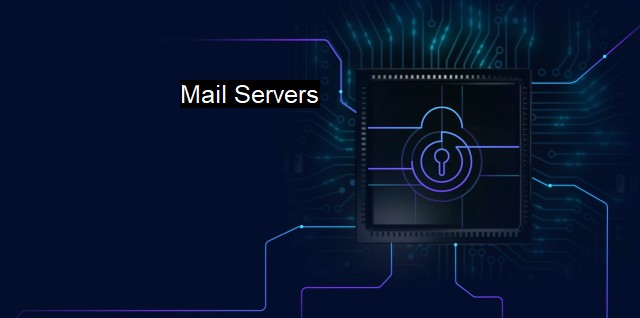What are Mail Servers?
Strengthening Cybersecurity: Understanding Mail Servers and Antivirus Measures to Protect Against Email Cyber Threats
"Mail servers" is a term that has become prevalent in the modern world due to the digitization of communication platforms. As the internet utilizes a vast multitude of interconnected servers around the world, there has been a rise in cyber threats through different access channels, with mail servers being one of the most notorious.A mail server is essentially a computer-enabled system that is responsible for receiving, handling, and delivering email messages sent over a network. Mail servers can send and receive messages in an instant, making them indispensable in our fast-paced world of online communication.
Mail servers operate using a client-server model. This means that a user client application, such as Microsoft Outlook or Apple Mail, connects to the mail server to send and receive messages. To perform their actions, mail servers typically rely on two core protocols: the Simple Mail Transfer Protocol (SMTP) for sending emails and the Internet Message Access Protocol (IMAP) or the Post Office Protocol (POP) for receiving them.
In the global context of cybersecurity, the vulnerability of mail servers hasn’t been enshrined. Cybercriminals often target mail servers primarily due to the sensitive information they can contain. Businesses, government entities, academics, and individuals use emails as a quick way to send and receive valuable data, making them a lucrative target for hackers and malicious software.
Since any illicit infiltration could compromise the integrity of the mail server and the integrity of the user's digitally stored information, cybersecurity measures have become imperative for every mail server used. This is where antivirus software solutions come into play.
Antivirus software is a specialized cyber tool that is used to deter, detect, and remove malicious software, often referred to as malware. The common types of malware include viruses, worms, trojans, ransomware, spyware among others. Their intentions range from breaching privacy for personal or financial gain, causing harm or disruption to services, corporate or state-related espionage, and even cyber warfare.
In the context of mail servers, the role of the antivirus is pivotal. Most antivirus programs offer real-time protection against malware that sort to attack the mail server. These antivirus programs continuously monitor the mail server for any 'suspicious' activities. Once detected, the antivirus software can either block it or flag the detected suspicious activities for further actions.
This protection and continuous monitoring extend to even the encrypted SSL connections that encrypt the communication over the network. Some antivirus services even offer supplementary services, such as anti-spam filters, that keep away undesirable or harmful emails from your system, by filtering out spam and malicious links, greatly reducing the risk of an attack.
While some may argue that designating stringent security protocols and subsequent regular updates of software may limit the entry-points of threats, with the ever-evolving threat landscape, antivirus applications are not just an additional layer of defense. Instead, they have become an indispensable facet of modern-day Cybersecurity. Considering the fact that cybersecurity threats continue to evolve and persist in adapting, similarly, the protective measures must also increasingly develop and strengthen. Therefore, employing the right antivirus is essential for ensuring the safety and integrity of mail servers.
Mail servers, though integral to facilitating efficient virtual communication, present useful attack opportunities for cybercriminals. Subsequently, it is of utmost importance for those leveraging the mail servers to stay equipped with protective cybersecurity measures, primarily a robust antivirus system, that can effectively counter potential intrusions and thus safeguard invaluable data.

Mail Servers FAQs
What is a mail server and how does it work?
A mail server is a computer program responsible for sending, receiving, and storing email messages. It works by using various network protocols to communicate with other mail servers, email clients, and antivirus software to ensure the safe transmission of data.What are the security risks associated with mail servers?
Mail servers are vulnerable to various cybersecurity threats, such as malware infections, spam, phishing attacks, and data theft. By compromising a mail server, attackers can gain unauthorized access to sensitive information, spread malicious software, or use the server to launch attacks against other targets.What is antivirus software, and how does it protect mail servers?
Antivirus software is designed to detect, prevent, and remove malicious software from a system. It protects mail servers by scanning incoming and outgoing email traffic for malware, spam, and other threats. Additionally, it can identify and quarantine infected messages or attachments, preventing them from reaching their intended recipients and spreading the infection.How can I ensure the security of my mail server?
To ensure the security of your mail server, you should regularly update your antivirus software and security patches, use strong passwords and encryption, restrict user privileges, and enforce access control policies. Additionally, you should monitor your server for suspicious activity, maintain backups of important data, and regularly test your security measures to identify and address any vulnerabilities.| | A | | | B | | | C | | | D | | | E | | | F | | | G | | | H | | | I | | | J | | | K | | | L | | | M | |
| | N | | | O | | | P | | | Q | | | R | | | S | | | T | | | U | | | V | | | W | | | X | | | Y | | | Z | |
| | 1 | | | 2 | | | 3 | | | 4 | | | 7 | | | 8 | | |||||||